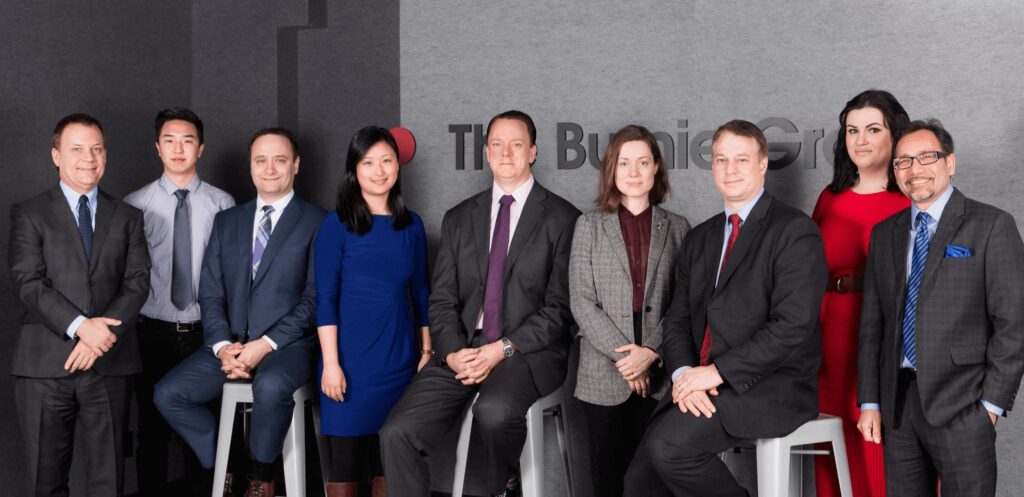
An interview with David Burnie, Founder & Principal of The Burnie Group
Winning the PROFIT 500 award has been a great milestone for The Burnie Group. Started 6 years ago in a coffee shop on Queen Street West, David Burnie and his group have come a long way in a very short time. Today the company occupies an entire floor right in the core of Toronto’s financial district on Bay Street.
I joined The Burnie Group just over a year ago as Marketing and Sales Manager, and in that time I’ve watched the company grow exponentially. Propelled forward by a shared commitment to our core mission of combining innovative management consulting with world-class technology, 30 people walk through the front door every morning ready to create meaningful impact for our clients. Earlier this month I sat down with David over lunch and we talked about how it all came to be. Bruna Sofia Simoes, Senior Manager, Marketing & Sales
Did you always want to start your own business?
David Burnie: Growing up, I had a strong drive to build and pursue projects that were entrepreneurial in nature—creating something that was my own, and being able to look back and say “hey, I built that” or “hey, this didn’t exist before, and now it does”—that has always been a great motivator for me.
When the time came for me to leave McKinsey, doing something entrepreneurial was my next logical step. I was in a position where I could give it a shot and if things didn’t work out I could always go back into industry. So, I committed 12 months to get ‘The Burnie Group’ off the ground, and nearly seven years later, here we are.
Why start a consulting firm?
When I decided that I was going to give this a shot, I explored a few different options, but what I always came back to, was building a consulting firm. I had the skills and capacity, and I believed, based on my experience, that there was a gap in the market. Consulting firms are really good at analyzing and dissecting problems, coming up with solutions, and then providing recommendations to clients. However, where they frequently fall short is in taking those recommendations and helping clients to move forward into execution and implementation.
The Burnie Group was founded with the intention of combining the best of what I’d learned in consulting with the tools and technology that would allow clients to execute and get results.
Tell me more about technology. How does it fill in that execution gap?
One of The Burnie Group’s first projects was to build Operations Excellence (OE) at a Big-5 bank. In the pursuit of bettering practices and behaviours, we’ve found that the integration of technology—in the case of an OE project, Workforce Management software—ensures that behavioural change can happen organically for the employees being impacted, in a way that is sustainable over the long-term for the company, while simultaneously opening up a whole new world of workforce data that allows managers to manage more effectively.
We constantly strive to be at the forefront of what’s new, and what stands to have incredible influence. We were the first consulting firm in Canada to adopt and embrace Robotic Process Automation (RPA), and we’ve been very successful in building this practice. We’re now doing the same with Blockchain because we understand the massive opportunity and impact this technology will have in the very near future.
We have, and will continue to invest time, energy, and resources in becoming fluent in these and other technologies so that we can always offer our clients the best possible recommendations and solutions to meet their needs.
Every now and then someone will mention your past as an athlete, but I’ve never actually heard the whole story. You were drafted for the CFL, can you tell me about that?
Growing up I loved sports and played basketball, football, volleyball, and track and field. Football happened to be a sport where I excelled. I had the right skills, capabilities, and size to do well. In university, I enjoyed being able to pursue both my academic education at the Ivey Business School and the comradery, fun, and excitement of playing football with the Western Mustangs.
I was fortunate to have great coaches and a great team to support me and I ended up winning the All Canadian and Academic All Canadian awards (recognizing both the academics excellence and my capabilities on the field). As a result, upon graduation, I was drafted by the Hamilton Tiger-Cats of the CFL.
The draft, while a dream come true, was also very conflicting. I had done well at business school and there were a number of businesses looking to hire me, and I found myself torn on which dream to pursue.
As luck would have it that conflict was resolved for me. I was drafted, I went to training camp, I had a really amazing experience, but I’d had recurring problems with my neck due to neck injuries sustained in university, and training with guys who were bigger, faster, stronger, brought those issues forward. Soon two of my vertebrae were being compressed and damaging the nerves through my left arm and part of the muscles in my back. So, while I probably could have gone through life without one arm, I decided I wanted two of them and gave up the football dream to start my business career.
Does your passion for sports influence the way you approach business?
Definitely. There are a number of parallels between the two. The first is drive and determination. In football and in business, you can’t sit back and relax and take a day off, if you do, your competition is going to get ahead. During the season and in the off-season, you’re always working hard to be the best that you can be. I employ that frame of mind with The Burnie Group.
The second is to always be one step ahead. You need to consider everything that’s happened before, the plays and the outcomes of those plays, and then take that knowledge and strategize different ways to do things. The strategic thinking you employ in football is very similar to business.
Finally, the whole team spirit and competitive nature of sport translate well to business, and I like to think of The Burnie Group as a team made of people with different skills in which they excel, who’ve come together to achieve a common goal.
The Burnie Group started with just you in a coffee shop, did you always know it would end up a group?
I actually felt a bit weird using the name The Burnie Group, when it was just me. But I always had the aspiration that it would be a collection of like-minded individuals who would come together and create impact for clients.
Can you name a person who has had a tremendous impact on you as a leader?
The person who has been a role model and whom I greatly respect as a leader is Alan Sellery. Al is the former CEO of Grocerygateway.com, and currently leads a private equity firm that he founded, Ironbridge Equity Partners.
When I worked with him at Grocerygateway.com, he demonstrated a solid combination of leadership and effective decision making. In particular, I admired that he doesn’t make decisions just because he’s the leader, he consults others, asks his team what their opinions are, ensuring the very best of an organization goes into every decision.
I think of some of the stories he’s told me about starting his own business, his drive, his determination to not give up, his faith in himself and his team, have constantly been an influence for me.
What is one characteristic that you believe every leader should possess?
Compassion. I think that if you can’t put yourself in the shoes of others, it’s difficult to be a good leader. You can be a taskmaster or a dictator who just tells people what to do; but to be a truly good leader you need to have the capacity to understand how people are feeling, what their priorities are, and how can you engage them to do their best work. If you can understand that and connect with people, then you’re going to get the most out of them.
What do you love about what you do? What concerns you the most about what you do?
I love being able to drive impact with our clients, especially because we’re doing it in really innovative ways. The Burnie Group does not just re-apply cookie cutter solutions, we think about new ways to help our clients achieve their goals. Whether that’s through Automation, Artificial Intelligence, or Blockchain, it’s fun to always be thinking about how we can help change the world.
What concerns me the most is the uncertainty. Someone once told me “a consulting firm is always 6 months away from going out of business” because you just never know. Right now, things are going great, but what will January look like? If there were more certainty it would be nice, but unfortunately, it’s just the nature of the business.
How do you handle failure?
I like to view failure as an opportunity to learn. What did we not do that would have resonated more with a potential client? What is it that we could do differently to get better? My football coach, Larry Haylor, at UWO, always had a saying “you’re either getting better, or you’re getting worse” and so, those opportunities of failure are a chance to get better, to learn, to see what was done wrong, what can be done differently, and get better.
How do you encourage creative thinking within your organization?
I had a manager at Procter & Gamble early in my career, Maureen Poile, who I would frequently go to with problems. One day she said to me “Dave, I never want you to come to me with a problem again. You can tell me what the problem is, but I want you to think through a possible solution and then we can work on it together.” Asking people to show up with solutions and not just problems pushes them to think independently. This is a practice I’ve tried to employ as a leader; it’s about asking the right questions so you can get better answers.
Seven years ago, you were just planning to start The Burnie Group, what did you imagine it would be now?
People frequently ask me: Are you where you expected to be? And Where do you expect to be in 5 years? When I started The Burnie Group it wasn’t with the goal of having a certain number of employees or a certain amount of revenue. What I wanted to do was build a company that does great work, where team members have fun, and, above all else, makes an impact.
My belief is that as long as we deliver results, continue to delight our clients, and enjoy what we’re doing, nothing can stop us.
What’s the next step for David Burnie and The Burnie Group?
I’m really excited about where we’re headed. We’re doing some really interesting things when it comes to Strategy; our RPA practice is a leader in Canada; we’ve begun doing some really innovative work around Blockchain, and our Operations Excellence and Benchmarking practices are industry-leading. So, I’m looking forward to continuing to build on this work.
What does winning PROFIT 500 mean for you?
I’m very proud of this moment. It’s a manifestation of so many things—doing a great job serving our clients, continuing to find great people to expand our business, growing both with our clients and individually as an organization—and all those things come together in PROFIT 500 as recognition for the hard work that we’ve put in.
Discover how Burnie group can support your organization.
CONTACT US
